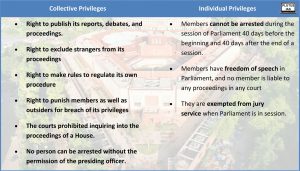22 Sep Legislators Immunity From Prosecution
This article covers “Daily Current Affairs” and the topic details “Legislators Immunity From Prosecution”. This topic has relevance in the Polity and Governance section of the UPSC CSE exam.
For Prelims:
Provisions related to Immunity and Privileges of Legislators?
For Mains:
GS 2: Polity and Governance
The significance of privileges?
Challenges and issues related to Privileges?
Why in the news:
The Supreme Court has recently referred the question of whether legislators’ legal immunity, as outlined in Articles 105(2) and 194(2) of the Constitution, extends to shielding them from criminal prosecution for the act of either giving or receiving a bribe to a seven-judge bench for further consideration.
Provisions related to Immunity and Privileges of Legislators
- The legal provisions that grant legislators immunity from prosecution are primarily outlined in Article 105 of the Constitution, which pertains to the “powers, privileges, etc. of the Houses of Parliament and of the members and committees thereof.”
- Article 105(2) stipulates that “No member of Parliament shall be subject to legal proceedings in any court for anything said or any vote cast by them in Parliament or any of its committees. Likewise, no individual shall be liable for legal action in relation to the publication of reports, papers, votes, or proceedings authorized by either House of Parliament.”
- In essence, this provision exempts Members of Parliament (MPs) from legal consequences for statements made or actions taken during their official duties. For example, they cannot be sued for defamation based on statements made within the House.
- Moreover, this immunity also extends to certain non-members who have the privilege to speak in Parliament, such as the Attorney General of India or a Minister who is not a member. In cases where a member’s speech goes beyond acceptable boundaries, the Speaker of the House is responsible for addressing the matter, rather than the court.
- Similarly, Article 194(2) extends this immunity to Members of Legislative Assemblies (MLAs) at the state level. It states that “No member of a State Legislature shall be subject to legal proceedings in any court for anything said or any vote cast by them in the Legislature or any of its committees. Additionally, no person shall be liable for legal action in relation to the publication of reports, papers, votes, or proceedings authorized by a House of such a Legislature.”
- In the current case, the court is tasked with determining whether the legal immunity enjoyed by parliamentarians extends to protection from prosecution for acts involving bribery, including demanding or accepting bribes.

The Current Supreme Court Case:
- Sita Soren, a Jharkhand Mukti Morcha (JMM) member, is facing accusations of accepting a bribe in exchange for her vote during the 2012 Rajya Sabha elections. A complaint prompted the Chief Election Commissioner to request a Central Bureau of Investigation (CBI) inquiry. The CBI filed charges against Soren, including bribery, criminal conspiracy, and misconduct under the Indian Penal Code and the Prevention of Corruption Act.
- Soren sought dismissal of the charges and legal proceedings, claiming immunity under Article 194(2) of the Constitution. The Jharkhand High Court rejected her plea in 2014. Consequently, she has approached the Supreme Court, seeking a review of the High Court’s decision.
The significance of privileges:
- Protecting Independence: They ensure that members of Legislature can carry out their duties without external interference or intimidation.
- Immunity from Arrest: This protection allows them to discharge their responsibilities without the fear of being detained or prosecuted.
- Freedom of Speech: Members of Legislature can speak openly and critically on various issues without the risk of legal repercussions.
- Privilege of Confidentiality: Legislators enjoy the privilege of confidentiality, which allows them to access and share sensitive information necessary for informed decision-making.
- Privilege of Access: Privileges grant lawmakers the privilege of access to critical information and resources that aid in their legislative functions. This access helps them make well-informed decisions and contribute effectively to the legislative process.
- Checks and Balances: These privileges are an essential component of the checks and balances within a democratic system. They contribute to maintaining the integrity of democratic institutions and enable them to function efficiently.
Challenges and issues related to Privileges:
- Scope and Boundaries: Defining the scope and boundaries of parliamentary privileges is a challenge. While intended to protect legislative independence, they must be balanced with accountability and transparency, which can sometimes be in tension.
- Conflict with Constitutional Principles: Privileges may at times appear to contradict fundamental constitutional principles like equality before the law.
- Misuse: Instances of lawmakers misusing their privileges have often occurred.
- Lack of Transparency: The process of claiming and enforcing parliamentary privileges lacks transparency in India. This opacity can hinder efforts to hold lawmakers accountable for their actions and erode public trust in the legislative system.
- Inadequate Oversight: There is a notable lack of robust oversight mechanisms to monitor and enforce parliamentary privileges.
Download plutus ias current affairs eng med 22nd Sep 2023
Q.1 Consider the following Articles of the Constitution:
- Article 105
- Article 194
- Article 84
- Article 117
How many of the above articles are related to the Privileges provided to the Legislators:
(a) Only one
(b) Only two
(c) Only three
(d) All four
Q.2 Consider the following regarding Parliamentary privileges:
- All the members of the Parliament enjoy the privileges.
- Anyone who is not a member of Parliament cannot have these privileges.
Which of the statements given above is/are correct?
(a) 1 only
(b) 2 only
(c) Both 1 and 2
(d) Neither 1 nor 2



No Comments